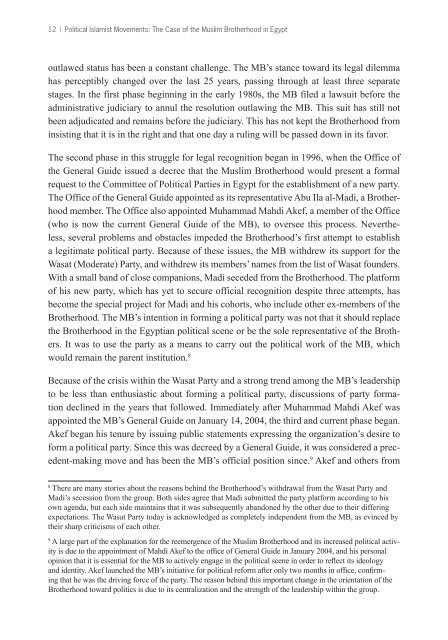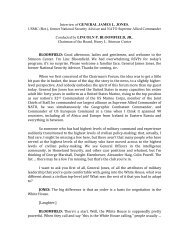Islam and Politics - The Stimson Center
Islam and Politics - The Stimson Center
Islam and Politics - The Stimson Center
You also want an ePaper? Increase the reach of your titles
YUMPU automatically turns print PDFs into web optimized ePapers that Google loves.
12 | Political <strong>Islam</strong>ist Movements: <strong>The</strong> Case of the Muslim Brotherhood in Egypt<br />
outlawed status has been a constant challenge. <strong>The</strong> MB’s stance toward its legal dilemma<br />
has perceptibly changed over the last 25 years, passing through at least three separate<br />
stages. In the first phase beginning in the early 1980s, the MB filed a lawsuit before the<br />
administrative judiciary to annul the resolution outlawing the MB. This suit has still not<br />
been adjudicated <strong>and</strong> remains before the judiciary. This has not kept the Brotherhood from<br />
insisting that it is in the right <strong>and</strong> that one day a ruling will be passed down in its favor.<br />
<strong>The</strong> second phase in this struggle for legal recognition began in 1996, when the Office of<br />
the General Guide issued a decree that the Muslim Brotherhood would present a formal<br />
request to the Committee of Political Parties in Egypt for the establishment of a new party.<br />
<strong>The</strong> Office of the General Guide appointed as its representative Abu Ila al-Madi, a Brotherhood<br />
member. <strong>The</strong> Office also appointed Muhammad Mahdi Akef, a member of the Office<br />
(who is now the current General Guide of the MB), to oversee this process. Nevertheless,<br />
several problems <strong>and</strong> obstacles impeded the Brotherhood’s first attempt to establish<br />
a legitimate political party. Because of these issues, the MB withdrew its support for the<br />
Wasat (Moderate) Party, <strong>and</strong> withdrew its members’ names from the list of Wasat founders.<br />
With a small b<strong>and</strong> of close companions, Madi seceded from the Brotherhood. <strong>The</strong> platform<br />
of his new party, which has yet to secure official recognition despite three attempts, has<br />
become the special project for Madi <strong>and</strong> his cohorts, who include other ex-members of the<br />
Brotherhood. <strong>The</strong> MB’s intention in forming a political party was not that it should replace<br />
the Brotherhood in the Egyptian political scene or be the sole representative of the Brothers.<br />
It was to use the party as a means to carry out the political work of the MB, which<br />
would remain the parent institution. 8<br />
Because of the crisis within the Wasat Party <strong>and</strong> a strong trend among the MB’s leadership<br />
to be less than enthusiastic about forming a political party, discussions of party formation<br />
declined in the years that followed. Immediately after Muhammad Mahdi Akef was<br />
appointed the MB’s General Guide on January 14, 2004, the third <strong>and</strong> current phase began.<br />
Akef began his tenure by issuing public statements expressing the organization’s desire to<br />
form a political party. Since this was decreed by a General Guide, it was considered a precedent-making<br />
move <strong>and</strong> has been the MB’s official position since. 9 Akef <strong>and</strong> others from<br />
8<br />
<strong>The</strong>re are many stories about the reasons behind the Brotherhood’s withdrawal from the Wasat Party <strong>and</strong><br />
Madi’s secession from the group. Both sides agree that Madi submitted the party platform according to his<br />
own agenda, but each side maintains that it was subsequently ab<strong>and</strong>oned by the other due to their differing<br />
expectations. <strong>The</strong> Wasat Party today is acknowledged as completely independent from the MB, as evinced by<br />
their sharp criticisms of each other.<br />
9<br />
A large part of the explanation for the reemergence of the Muslim Brotherhood <strong>and</strong> its increased political activity<br />
is due to the appointment of Mahdi Akef to the office of General Guide in January 2004, <strong>and</strong> his personal<br />
opinion that it is essential for the MB to actively engage in the political scene in order to reflect its ideology<br />
<strong>and</strong> identity. Akef launched the MB’s initiative for political reform after only two months in office, confirming<br />
that he was the driving force of the party. <strong>The</strong> reason behind this important change in the orientation of the<br />
Brotherhood toward politics is due to its centralization <strong>and</strong> the strength of the leadership within the group.

















